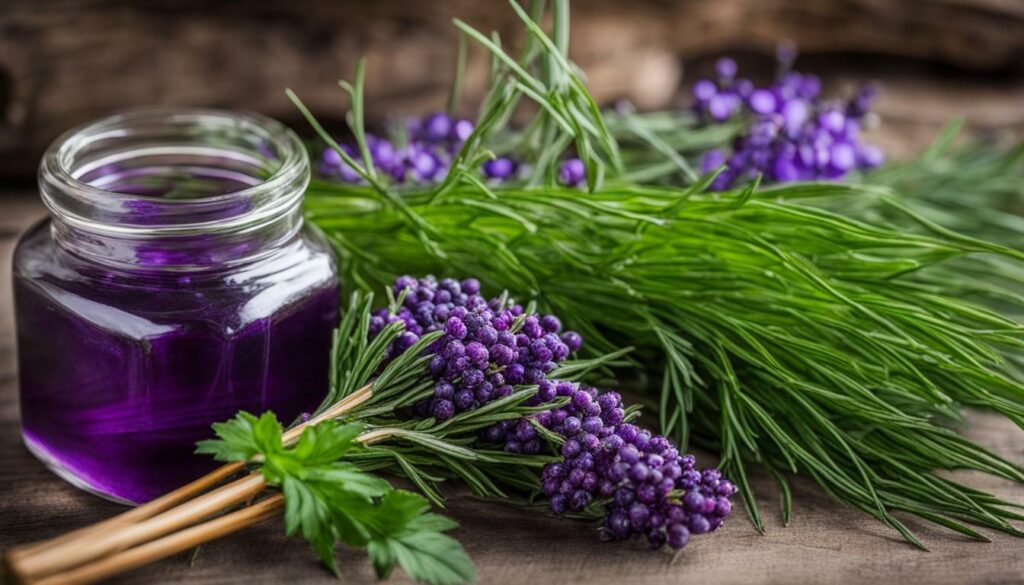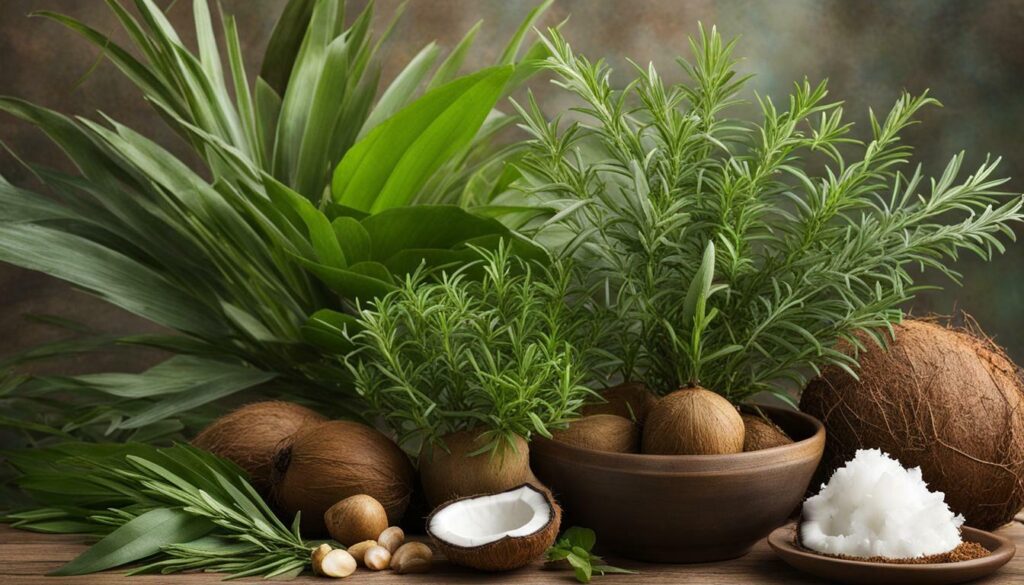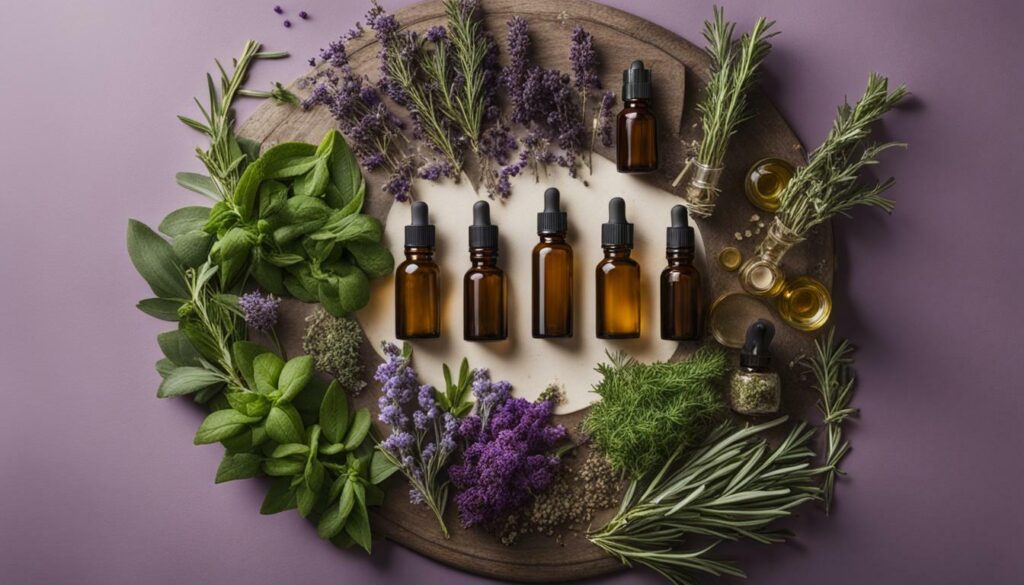
Welcome to our guide on natural hair loss prevention using herbal medicine. In this article, we’ll explore the power of herbal remedies and how they can effectively address hair loss.
Key Takeaways:
- Herbal medicine offers a natural approach to preventing hair loss.
- Studies have shown the effectiveness of specific herbs in treating alopecia.
- Herbs like licorice, aloe vera, and sesame seeds provide nourishment for healthy hair growth.
- Coconut oil, rosemary, and amla promote optimal scalp health.
- Incorporating herbal treatments, such as curry leaves and tulsi, into your routine can improve hair health.
Understanding Hair Loss and Its Causes
Before delving into herbal medicine for hair loss, it’s crucial to understand the underlying causes of this common issue. By identifying the factors that contribute to hair loss, we can better explore effective herbal remedies and find natural solutions.
Hair loss, or alopecia, can be caused by a variety of factors, including genetics, hormonal imbalances, nutritional deficiencies, and environmental factors. Stress, certain medications, and underlying medical conditions can also contribute to hair loss. Understanding the root cause of hair loss is key to finding the most suitable herbal remedies for addressing the issue.
Herbal medicine offers a natural and holistic approach to preventing hair loss. Various studies have shown that certain herbs and plants possess evidence-based effects against alopecia. For example, herbs such as Curcuma aeruginosa, Serenoa repens, Cucurbita pepo, Trifolium pratense, and Panax ginseng have been found to inhibit 5α-reductase activity, improve nutritional support, and enhance scalp blood circulation. These effects can help reduce hair loss and promote hair regrowth.
In addition to these effective herbs, there are other herbal remedies that can help prevent hair loss and promote healthy hair growth. Licorice, aloe vera, bhringraj, and sesame seeds are known for their nourishing properties and can provide essential nutrients to the hair and scalp. Coconut oil, rosemary, amla, neem, ginseng, sage, curry leaves, and tulsi are beneficial for scalp health, as they improve blood circulation and maintain a healthy environment for hair growth.
Table: Effective Herbs for Hair Loss
| Herb | Effectiveness |
|---|---|
| Curcuma aeruginosa | Inhibits 5α-reductase activity |
| Serenoa repens | Improves nutritional support |
| Cucurbita pepo | Enhances scalp blood circulation |
| Trifolium pratense | Promotes hair regrowth |
| Panax ginseng | Reduces hair loss |
By incorporating herbal medicine into our hair care routines, we can nourish our hair, promote scalp health, and prevent hair loss. Herbal remedies offer a natural and effective alternative to conventional treatments, and they provide a holistic approach to hair care. With the wide range of herbs available, we have the opportunity to embrace herbal medicine for maintaining healthy and beautiful hair.

With numerous studies conducted, there is a growing body of evidence supporting the effectiveness of herbal medicine in combating hair loss. Let’s explore some of the key herbs that have shown remarkable results in hair regeneration and adopt a holistic approach to hair loss prevention.
One of the standout herbs for hair loss is Curcuma aeruginosa. This plant has been found to inhibit 5α-reductase activity, an enzyme responsible for converting testosterone into dihydrotestosterone (DHT), which is known to contribute to hair loss. By blocking this enzyme, Curcuma aeruginosa can help prevent hair thinning and promote hair growth.
Another herb that has shown promise in hair regeneration is Serenoa repens, commonly known as saw palmetto. This herb has been found to inhibit the activity of 5α-reductase as well, making it an effective natural remedy for hair loss. Saw palmetto also helps improve nutritional support to the hair follicles, promoting healthy hair growth.
Cucurbita pepo, Trifolium pratense, and Panax ginseng are other herbs that have been studied for their effects on hair loss. Cucurbita pepo, or pumpkin seed extract, has been shown to reduce hair loss and increase hair count in individuals with androgenetic alopecia. Trifolium pratense, also known as red clover, contains compounds that can inhibit 5α-reductase activity and stimulate hair regrowth. Panax ginseng, often used in traditional Chinese medicine, has been found to enhance scalp blood circulation and promote hair growth.
The use of these herbs, along with others like licorice, aloe vera, bhringraj, sesame seeds, coconut oil, rosemary, amla, neem, ginseng, sage, curry leaves, and tulsi, can provide nourishment, improve blood circulation, and maintain scalp health. By adopting a holistic approach that combines the benefits of these herbal remedies, we can effectively prevent hair loss and promote hair regeneration.

To nurture strong and healthy hair, herbal supplements and specific nourishing herbs play a vital role. Let’s explore the benefits of licorice, aloe vera, bhringraj, and sesame seeds in promoting hair growth and maintaining scalp health.
Licorice: Licorice root is known for its soothing properties and its ability to calm inflammation on the scalp. It helps to balance oil production, making it beneficial for those with oily or combination scalps. Licorice also contains phytoestrogens that can block the negative effects of DHT, a hormone linked to hair loss. This herb is often used in hair care products for its moisturizing and conditioning properties.
Aloe Vera: Aloe vera has been used for centuries to promote hair growth and maintain scalp health. It contains enzymes that stimulate hair follicles, aiding in hair growth. Aloe vera also has moisturizing properties and helps to balance the pH level of the scalp, preventing dryness and irritation. Additionally, it helps to reduce dandruff and soothe scalp inflammation, promoting a healthy environment for hair growth.
| Herb | Benefits |
|---|---|
| Licorice | Calms inflammation, balances oil production, blocks DHT |
| Aloe Vera | Stimulates hair follicles, moisturizes scalp, reduces dandruff |
Bhringraj: Bhringraj, also known as “false daisy,” is a powerful herb in Ayurvedic medicine renowned for its hair benefits. It helps to strengthen the hair follicles, prevent premature graying, and promote hair growth. Bhringraj oil is often used to nourish the scalp, improve blood circulation, and reduce hair fall. Regular use of bhringraj can result in lustrous and healthy hair.
Sesame Seeds: Sesame seeds are rich in nutrients, including protein, iron, calcium, magnesium, and vitamins B and E. These nutrients promote healthy hair growth by nourishing the scalp and hair follicles. Sesame seeds also contain antioxidants that help to reduce scalp oxidative stress and protect against hair damage. Including sesame seeds in your diet or applying sesame oil topically can benefit overall hair health.
| Herb | Benefits |
|---|---|
| Bhringraj | Strengthens hair follicles, prevents premature graying, promotes hair growth |
| Sesame Seeds | Nourishes scalp, promotes healthy hair growth, protects against damage |
By incorporating licorice, aloe vera, bhringraj, and sesame seeds into your hair care routine, you can provide essential nourishment to your hair and maintain a healthy scalp. Whether using them individually or in hair care products, these herbal remedies offer natural solutions for promoting hair growth and preventing hair loss.

Promoting Scalp Health with Herbal Remedies
A healthy scalp is essential for healthy hair growth. Explore the benefits of coconut oil, rosemary, amla, neem, ginseng, and sage as herbal remedies that promote scalp health, improve blood circulation, and provide vital nourishment to prevent hair loss.

Coconut oil, known for its nourishing properties, can deeply penetrate the scalp and hair follicles, providing essential moisture and reducing inflammation. Its antibacterial and anti-fungal properties help maintain a healthy scalp and prevent dandruff, which can contribute to hair loss.
Rosemary has been used for centuries as a natural remedy for hair care. It stimulates blood circulation in the scalp, promoting hair growth and preventing hair loss. Rosemary oil can also help balance the scalp’s natural oils, reducing excess oiliness or dryness.
Amla, also known as Indian gooseberry, is rich in vitamin C, antioxidants, and essential fatty acids. It strengthens the hair follicles, prevents premature graying, and nourishes the scalp, promoting healthy hair growth. Amla can be consumed orally or applied topically as an oil or mask.
Neem, often referred to as the “miracle tree,” has antibacterial, antifungal, and anti-inflammatory properties. It helps maintain a healthy scalp by addressing various scalp conditions, such as dandruff and scalp infections. Neem oil can be used in combination with other herbal remedies for optimal results.
The Benefits of Ginseng and Sage for Scalp Health
Ginseng, a popular adaptogenic herb, has been used for centuries in traditional Chinese medicine to promote overall well-being. When it comes to hair health, ginseng stimulates blood flow to the scalp, improving nutrient delivery to the hair follicles and promoting hair growth. It also helps balance the scalp’s oil production, preventing excessive oiliness or dryness.
Sage, known for its cleansing and antimicrobial properties, is an excellent herbal remedy for scalp health. It helps regulate sebum production and reduces scalp inflammation, promoting a healthy environment for hair growth. Sage can be used as an essential oil or as a rinse after shampooing to invigorate the scalp.
By incorporating these herbal remedies into your hair care routine, you can nourish and promote the health of your scalp, leading to stronger, healthier hair. Remember to consult with a healthcare professional or herbalist before starting any new herbal remedies to ensure they are safe and appropriate for your individual needs.
Incorporating Herbal Medicine into Your Hair Care Routine
To achieve the best results, it’s important to incorporate herbal medicine into your regular hair care routine. Discover the benefits of curry leaves, tulsi, and other herbal treatments for hair loss, and learn how to use them effectively in your daily hair care regimen.
Curry leaves are known for their ability to strengthen hair follicles and prevent premature graying. You can create a nourishing hair mask by crushing a handful of curry leaves and mixing them with a tablespoon of coconut oil. Apply this mixture to your scalp and hair, leaving it on for 30 minutes before rinsing it off. Regular use of this herbal treatment can promote hair growth and maintain the natural color of your hair.
Tulsi, also known as holy basil, is another powerful herb for hair health. It has antimicrobial properties that can help combat scalp infections and dandruff. You can make a hair rinse by boiling a handful of tulsi leaves in water and allowing it to cool. Pour the cooled tulsi water over your hair after shampooing, and massage it into your scalp. This herbal treatment will not only promote scalp health but also add shine to your hair.
In addition to curry leaves and tulsi, there are many other herbal treatments that can contribute to healthy hair. Incorporating licorice, aloe vera, bhringraj, sesame seeds, coconut oil, rosemary, amla, neem, ginseng, and sage into your hair care routine can provide the necessary nourishment, improve blood circulation, and maintain scalp health. Experiment with these herbs and find the ones that work best for your hair type and concerns.
| Herb | Benefits |
|---|---|
| Licorice | Reduces scalp inflammation and promotes hair growth |
| Aloe vera | Moisturizes the scalp and strengthens hair strands |
| Bhringraj | Prevents hair loss, promotes hair growth, and reduces dandruff |
| Sesame seeds | Rich in nutrients that nourish the scalp and strengthen hair |
By incorporating these herbal treatments into your hair care routine, you can experience the natural benefits they offer and support the overall health of your hair. Remember to consult with a healthcare professional or herbalist before making any significant changes to your hair care routine, especially if you have underlying medical conditions or are taking medications.

Embracing herbal medicine is a natural and effective way to maintain hair health and prevent hair loss. With a wide range of natural remedies available, it’s possible to achieve strong, healthy hair through the power of herbs.
Studies have shown that certain herbs, such as Curcuma aeruginosa, Serenoa repens, Cucurbita pepo, Trifolium pratense, and Panax ginseng, have evidence-based effects against alopecia. These plants have been found to inhibit 5α-reductase activity, improve nutritional support, and enhance scalp blood circulation, which are crucial factors in preventing hair loss.
In addition to these herbal powerhouses, there are other remedies that can help nourish and strengthen your hair. Licorice, aloe vera, bhringraj, sesame seeds, coconut oil, rosemary, amla, neem, ginseng, sage, curry leaves, and tulsi all play a significant role in promoting healthy hair growth.
These herbs provide essential nutrients, improve blood circulation to the scalp, and maintain scalp health, ensuring a favorable environment for hair growth. By incorporating these herbal remedies into your hair care routine, you can take proactive steps towards preventing hair loss and achieving the luscious locks you desire.
So, why rely on chemical-laden products when you can harness the power of nature? Explore the world of herbal medicine for hair health and discover the incredible benefits it can offer. With the right combination of herbs and a consistent hair care routine, you can embrace natural remedies for hair loss and enjoy strong, healthy hair for years to come!
FAQ
Can herbal medicine really prevent hair loss?
Yes, various studies have shown that herbal preparations can be effective in treating hair loss. Certain herbs and plants have demonstrated evidence-based effects against alopecia, inhibiting 5α-reductase activity and improving scalp blood circulation.
What are some herbs that can help prevent hair loss?
Some herbs that have shown potential in preventing hair loss include licorice, aloe vera, bhringraj, sesame seeds, coconut oil, rosemary, amla, neem, ginseng, sage, curry leaves, and tulsi. These herbs provide nourishment, improve blood circulation, and maintain scalp health.
How do herbal remedies promote hair growth?
Herbal remedies nourish the hair and scalp, promoting hair growth by improving blood circulation and maintaining scalp health. They also provide essential nutrients that support healthy hair growth and help prevent hair loss.
How can I incorporate herbal medicine into my hair care routine?
You can incorporate herbal medicine into your hair care routine by using herbal supplements, incorporating herbs into homemade hair masks or oils, or using herbal shampoos and conditioners. It’s important to follow recommended usage guidelines and consult a professional if needed.
Are there any side effects associated with herbal medicine for hair loss?
Generally, herbal medicine is considered safe for hair loss prevention. However, individual reactions may vary. It’s always a good idea to perform a patch test before using any new herbal product and consult with a healthcare professional if you have any concerns or pre-existing conditions.
How long does it take to see results with herbal medicine for hair loss?
The time it takes to see results may vary depending on individual factors such as the underlying cause of hair loss and the specific herbal remedies used. Consistency and patience are key when using herbal medicine for hair loss prevention.



